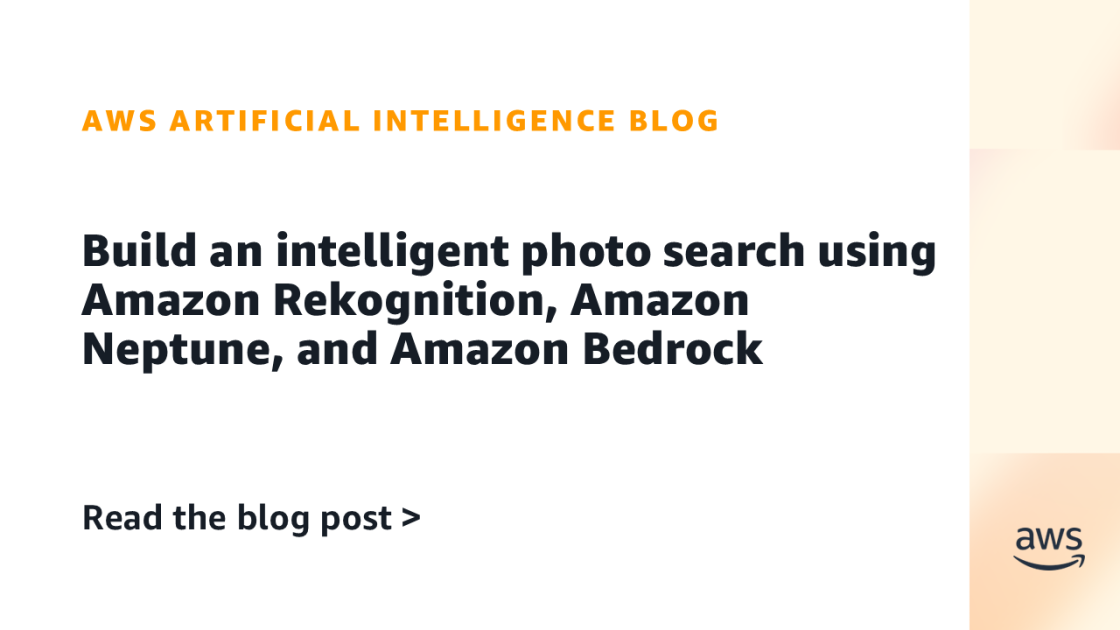
In this post, we show you how to build a comprehensive photo search system using the AWS Cloud Development Kit (AWS CDK) that integrates Amazon Rekognition for face and object detection, Amazon Neptune for relationship mapping, and Amazon Bedrock for AI-powered captioning.
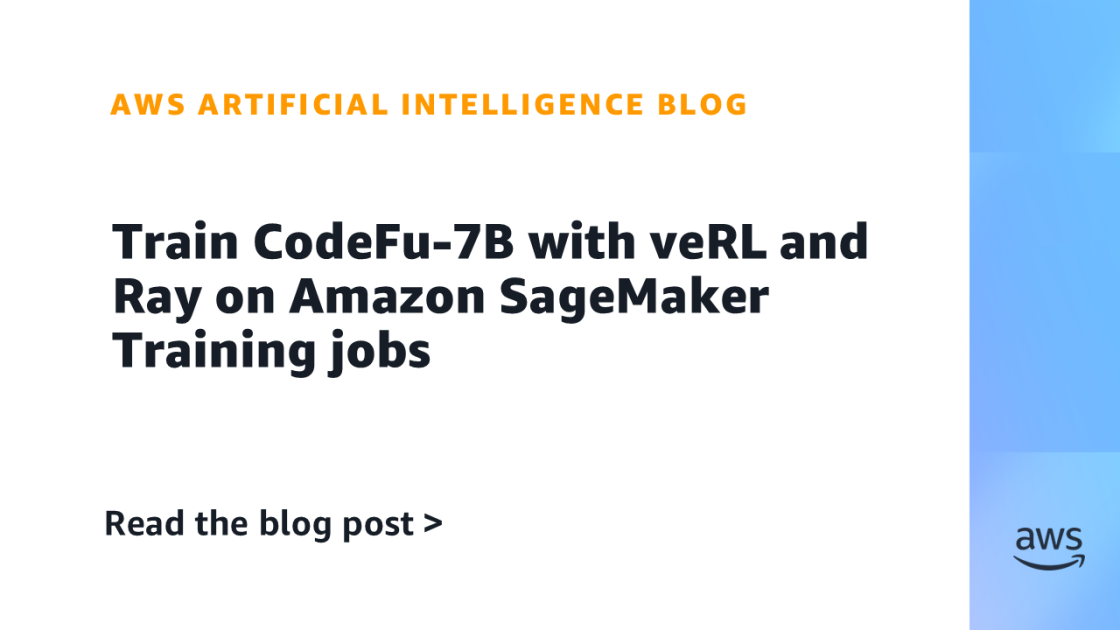
In this post, we demonstrate how to train CodeFu-7B, a specialized 7-billion parameter model for competitive programming, using Group Relative Policy Optimization (GRPO) with veRL, a flexible and efficient training library for large language models (LLMs) that enables straightforward extension of diverse RL algorithms and seamless integration with existing LLM infrastructure, within a distributed Ray cluster managed by SageMaker training jobs. We walk through the complete implementation, covering data preparation, distributed training setup, and comprehensive observability, showcasing how this unified approach delivers both computational scale and developer experience for sophisticated RL training workloads.
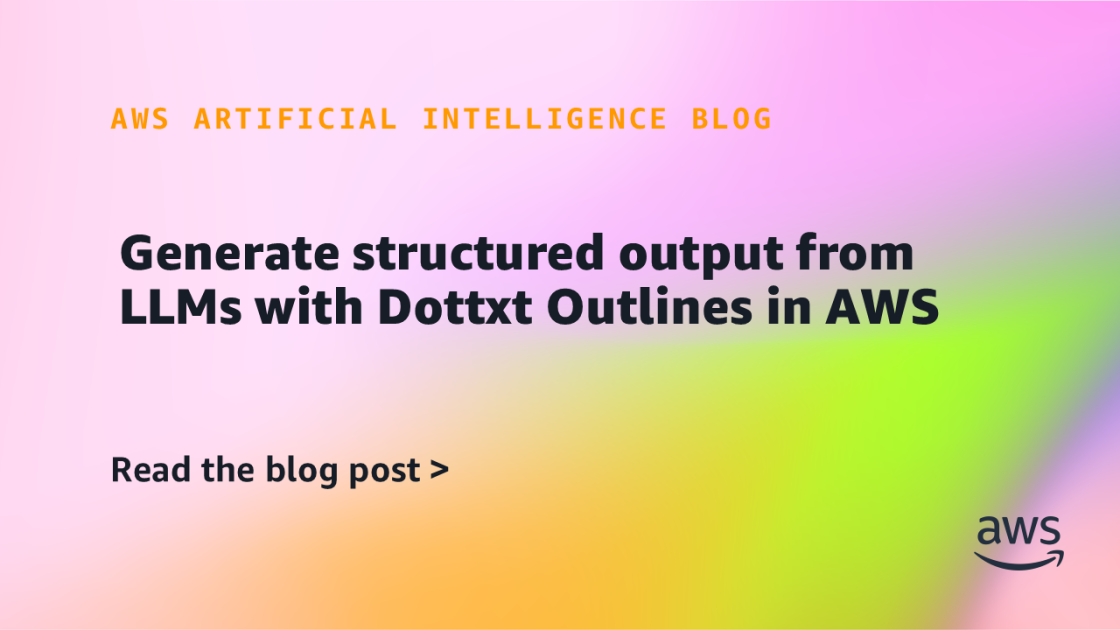
This post explores the implementation of Dottxt’s Outlines framework as a practical approach to implementing structured outputs using AWS Marketplace in Amazon SageMaker.
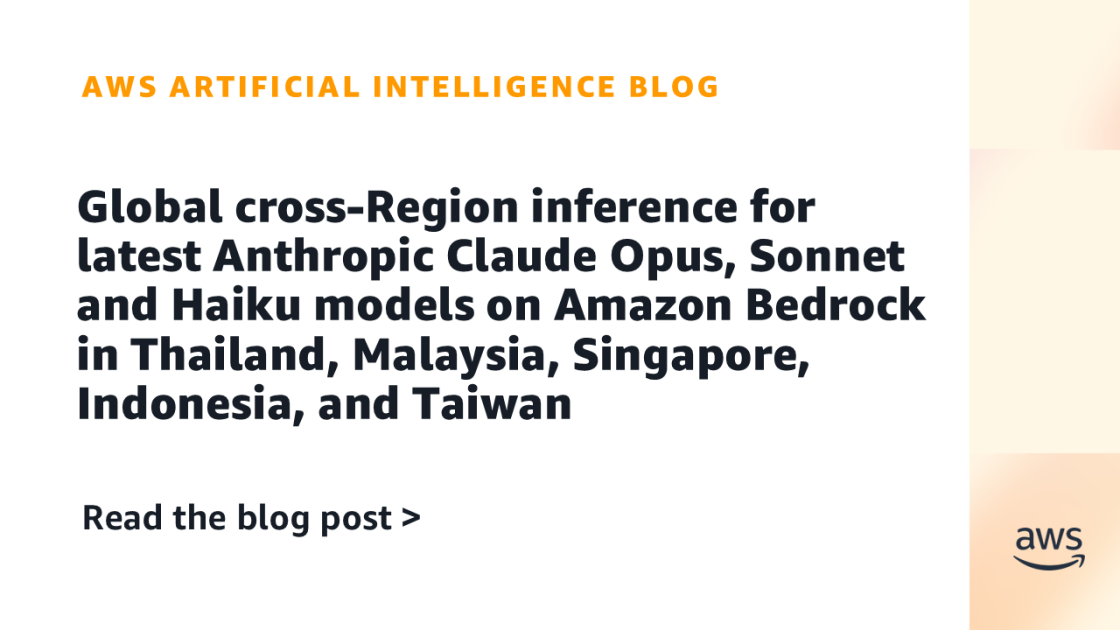
In this post, we are exciting to announce availability of Global CRIS for customers in Thailand, Malaysia, Singapore, Indonesia, and Taiwan and give a walkthrough of technical implementation steps, and cover quota management best practices to maximize the value of your AI Inference deployments. We also provide guidance on best practices for production deployments.
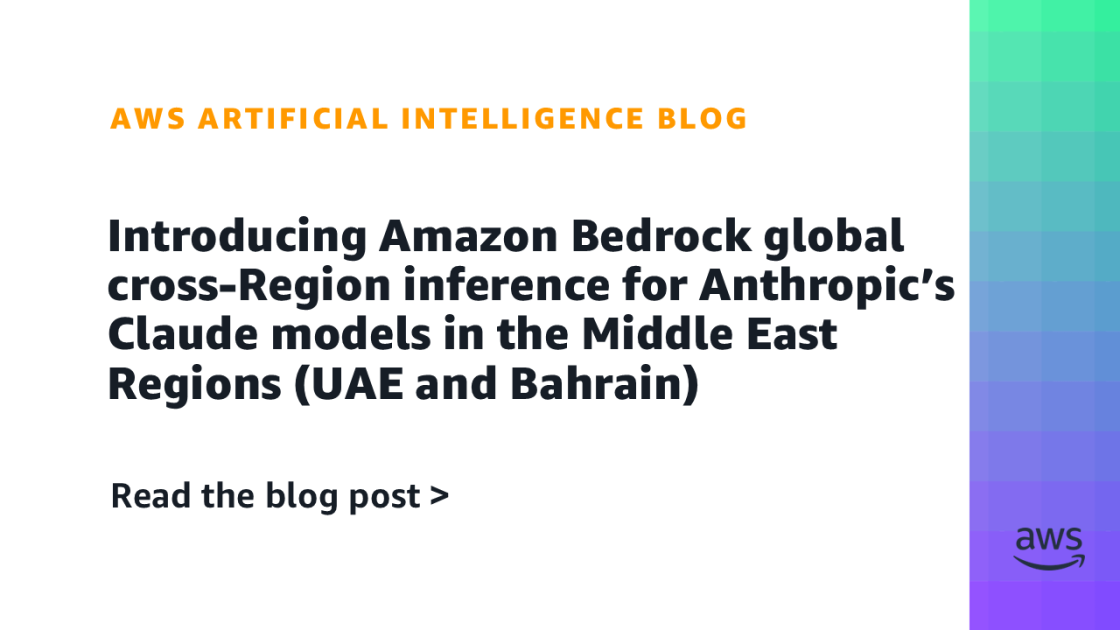
We’re excited to announce the availability of Anthropic’s Claude Opus 4.6, Claude Sonnet 4.6, Claude Opus 4.5, Claude Sonnet 4.5, and Claude Haiku 4.5 through Amazon Bedrock global cross-Region inference for customers operating in the Middle East. In this post, we guide you through the capabilities of each Anthropic Claude model variant, the key advantages of global cross-Region inference including improved resilience, real-world use cases you can implement, and a code example to help you start building generative AI applications immediately.

In this post, we examine how Bedrock Robotics tackles this challenge. By joining the AWS Physical AI Fellowship, the startup partnered with the AWS Generative AI Innovation Center to apply vision-language models that analyze construction video footage, extract operational details, and generate labeled training datasets at scale, to improve data preparation for autonomous construction equipment.
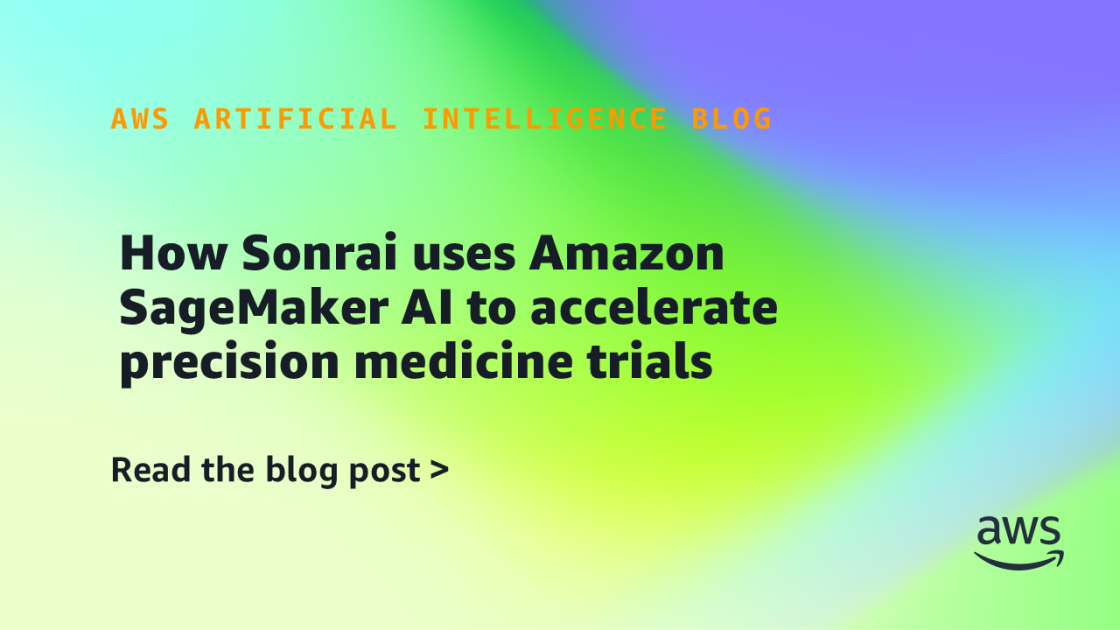
In this post, we explore how Sonrai, a life sciences AI company, partnered with AWS to build a robust MLOps framework using Amazon SageMaker AI that addresses these challenges while maintaining the traceability and reproducibility required in regulated environments.
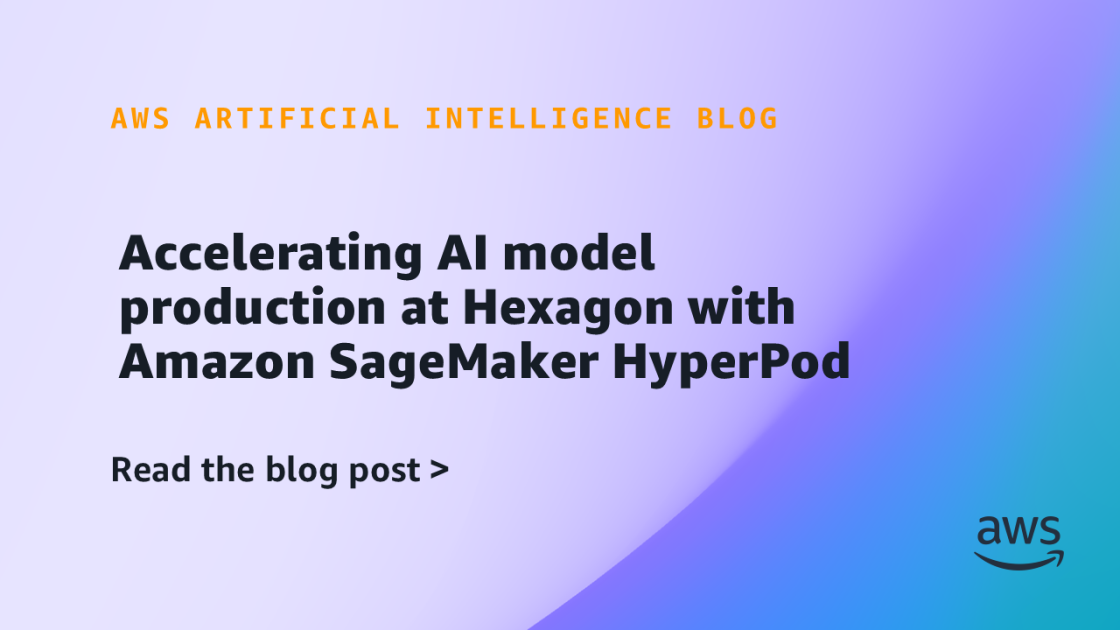
In this blog post, we demonstrate how Hexagon collaborated with Amazon Web Services to scale their AI model production by pretraining state-of-the-art segmentation models, using the model training infrastructure of Amazon SageMaker HyperPod.
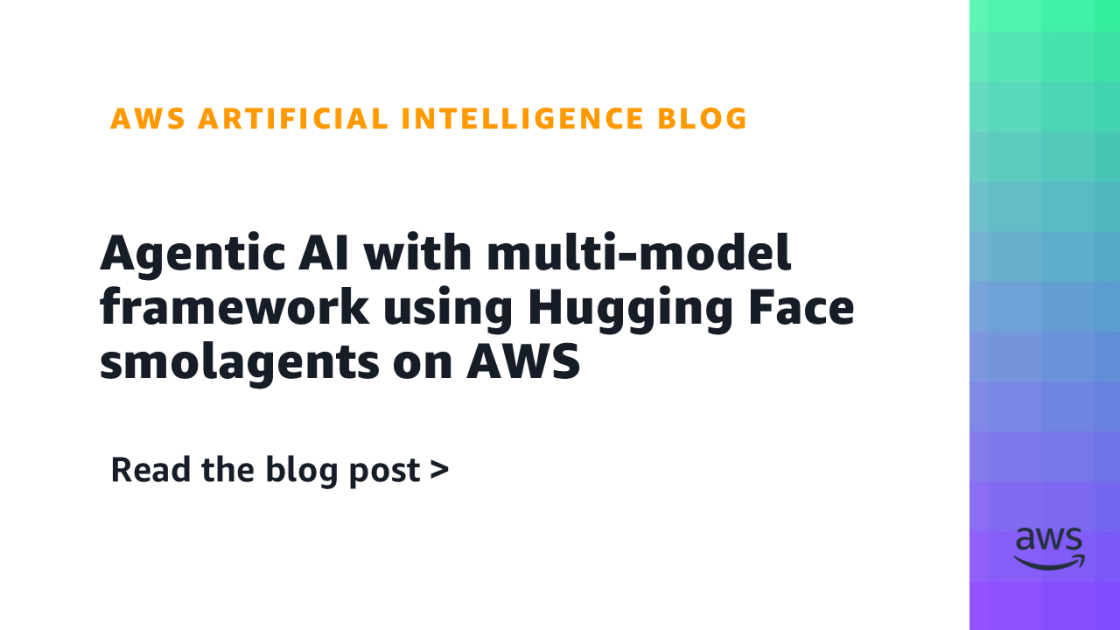
Hugging Face smolagents is an open source Python library designed to make it straightforward to build and run agents using a few lines of code. We will show you how to build an agentic AI solution by integrating Hugging Face smolagents with Amazon Web Services (AWS) managed services. You'll learn how to deploy a healthcare AI agent that demonstrates multi-model deployment options, vector-enhanced knowledge retrieval, and clinical decision support capabilities.
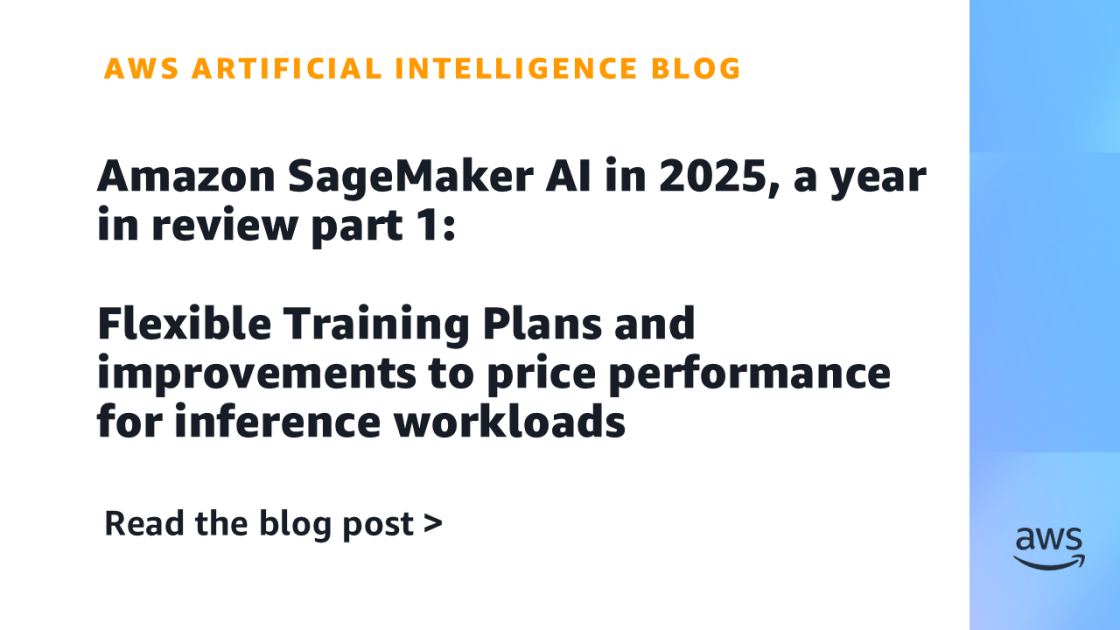
In 2025, Amazon SageMaker AI saw dramatic improvements to core infrastructure offerings along four dimensions: capacity, price performance, observability, and usability. In this series of posts, we discuss these various improvements and their benefits. In Part 1, we discuss capacity improvements with the launch of Flexible Training Plans. We also describe improvements to price performance for inference workloads. In Part 2, we discuss enhancements made to observability, model customization, and model hosting.
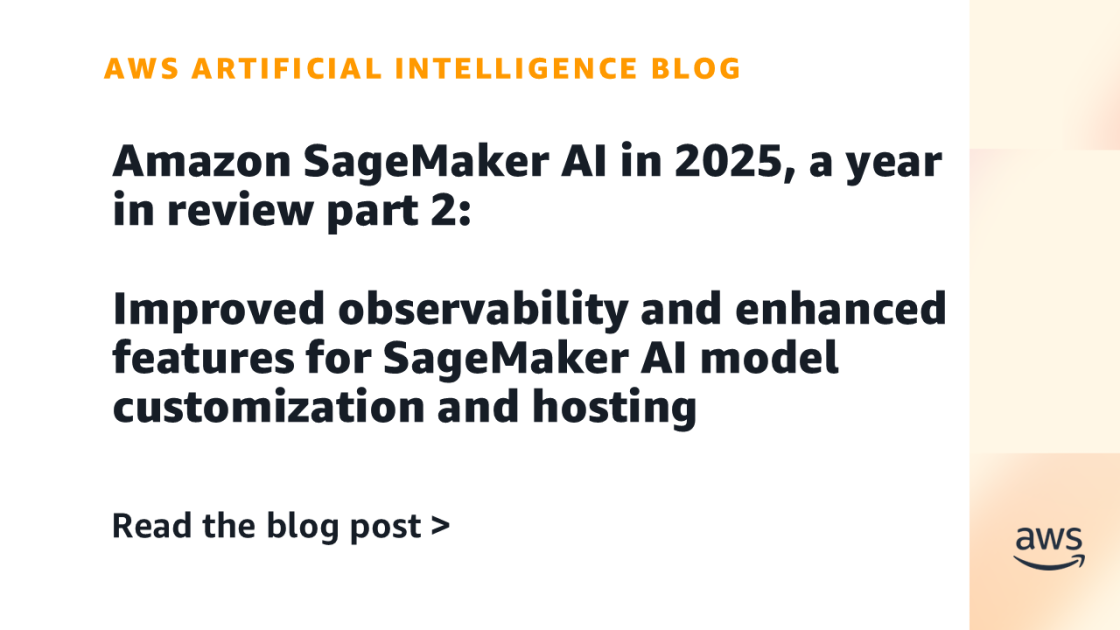
In 2025, Amazon SageMaker AI made several improvements designed to help you train, tune, and host generative AI workloads. In Part 1 of this series, we discussed Flexible Training Plans and price performance improvements made to inference components. In this post, we discuss enhancements made to observability, model customization, and model hosting. These improvements facilitate a whole new class of customer use cases to be hosted on SageMaker AI.
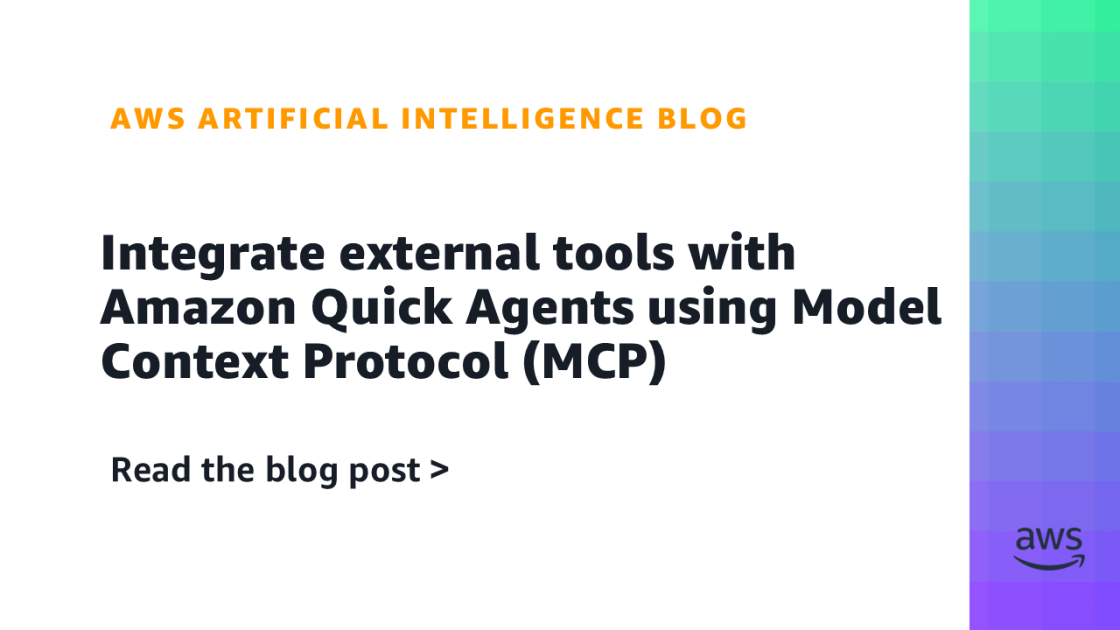
In this post, you’ll use a six-step checklist to build a new MCP server or validate and adjust an existing MCP server for Amazon Quick integration. The Amazon Quick User Guide describes the MCP client behavior and constraints. This is a “How to” guide for detailed implementation required by 3P partners to integrate with Amazon Quick with MCP.
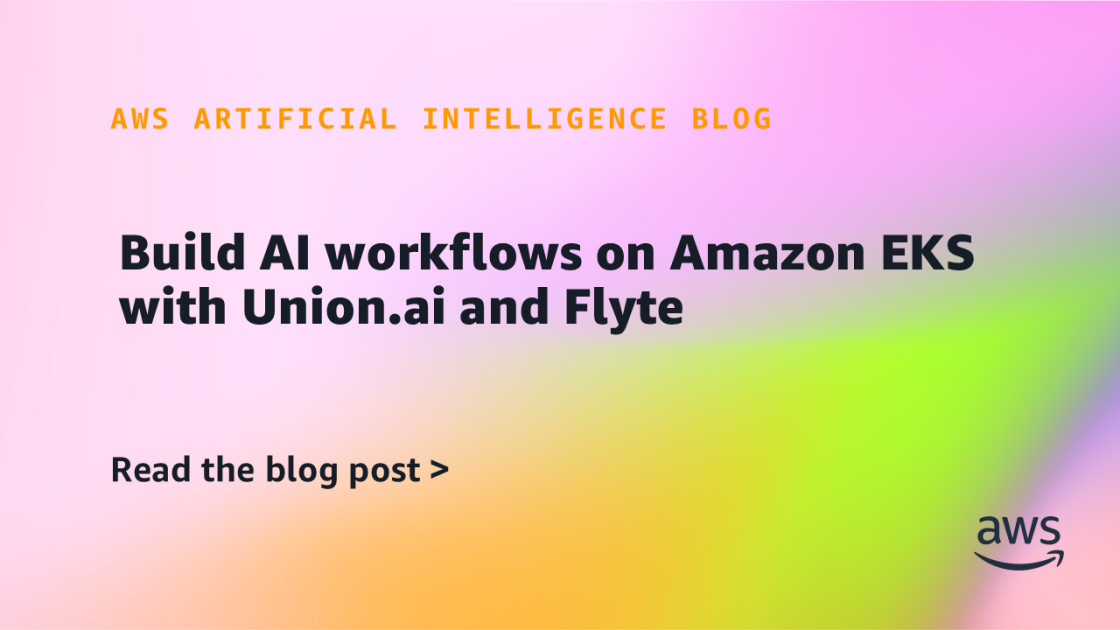
In this post, we explain how you can use the Flyte Python SDK to orchestrate and scale AI/ML workflows. We explore how the Union.ai 2.0 system enables deployment of Flyte on Amazon Elastic Kubernetes Service (Amazon EKS), integrating seamlessly with AWS services like Amazon Simple Storage Service (Amazon S3), Amazon Aurora, AWS Identity and Access Management (IAM), and Amazon CloudWatch. We explore the solution through an AI workflow example, using the new Amazon S3 Vectors service.
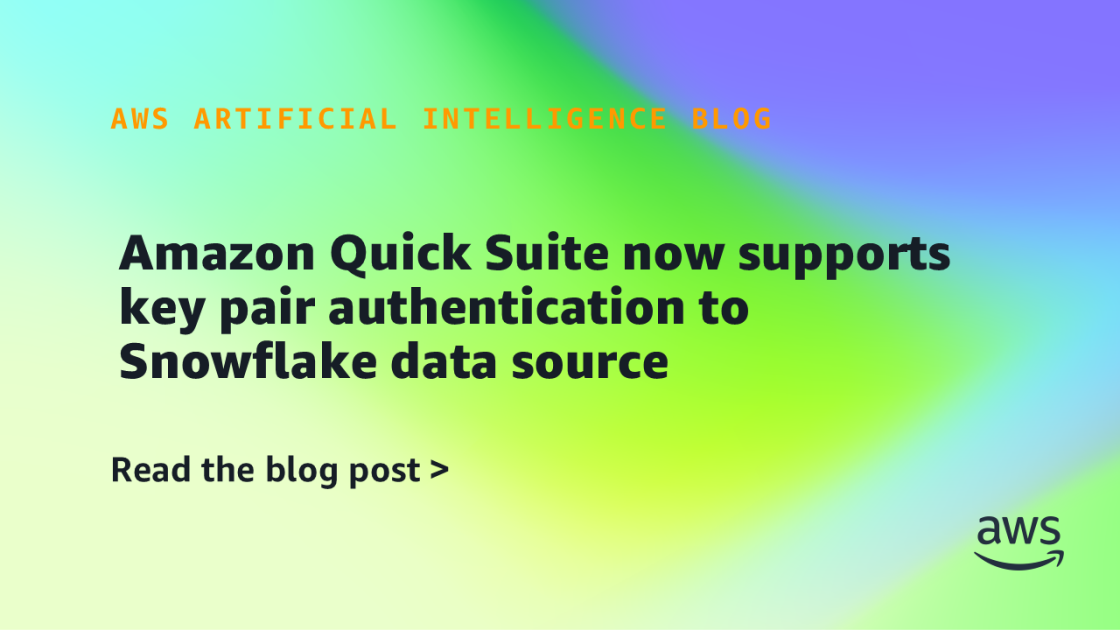
In this blog post, we will guide you through establishing data source connectivity between Amazon Quick Sight and Snowflake through secure key pair authentication.
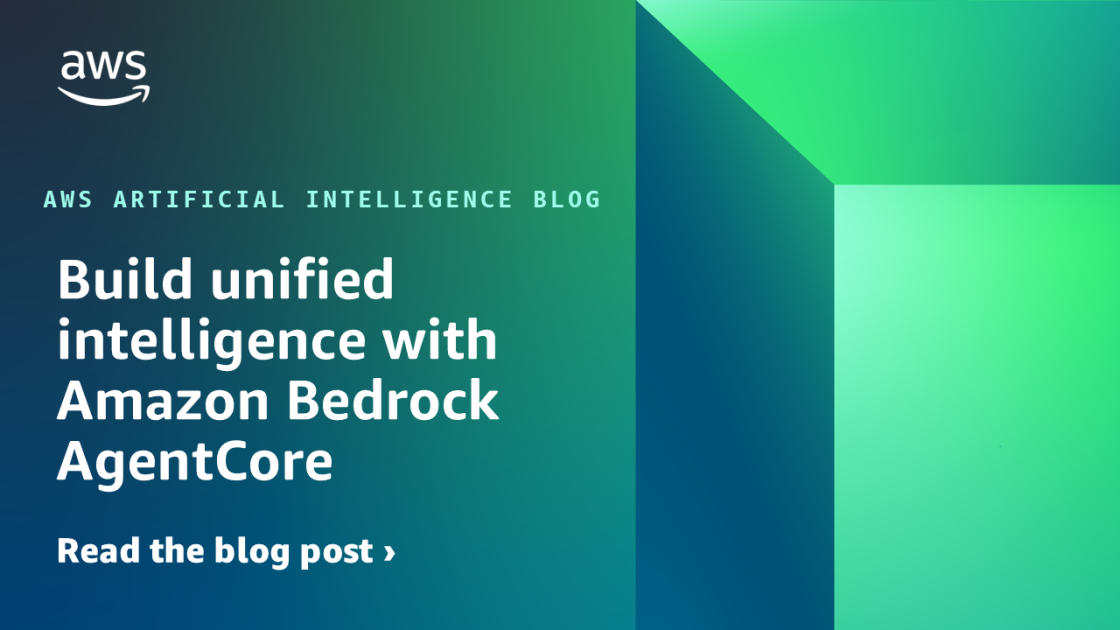
In this post, we demonstrate how to build unified intelligence systems using Amazon Bedrock AgentCore through our real-world implementation of the Customer Agent and Knowledge Engine (CAKE).
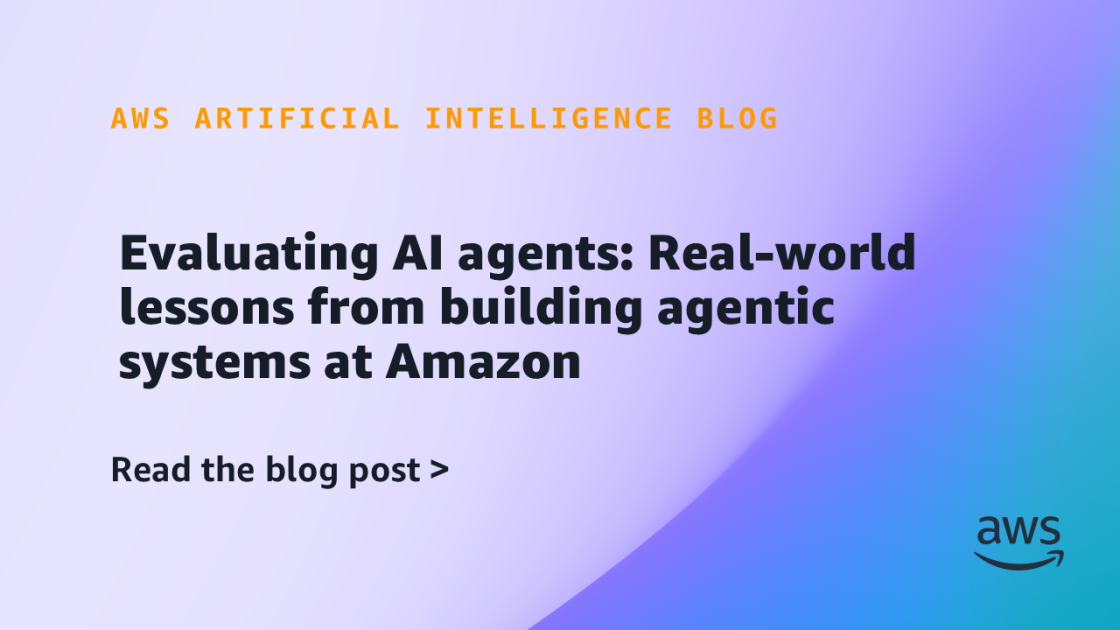
In this post, we present a comprehensive evaluation framework for Amazon agentic AI systems that addresses the complexity of agentic AI applications at Amazon through two core components: a generic evaluation workflow that standardizes assessment procedures across diverse agent implementations, and an agent evaluation library that provides systematic measurements and metrics in Amazon Bedrock AgentCore Evaluations, along with Amazon use case-specific evaluation approaches and metrics.
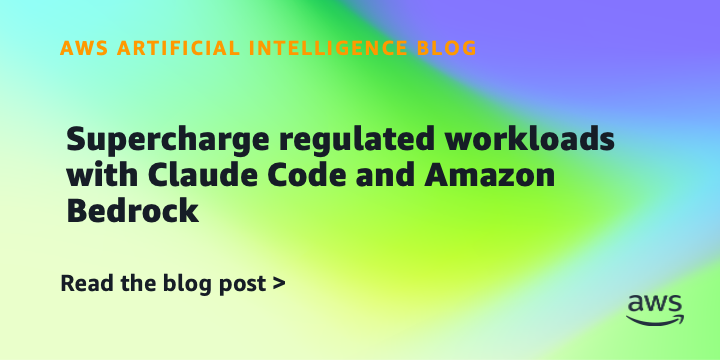
The release of Anthropic Claude Sonnet 4.5 in the AWS GovCloud (US) Region introduces a straightforward on-ramp for AI-assisted development for workloads with regulatory compliance requirements. In this post, we explore how to combine Claude Sonnet 4.5 on Amazon Bedrock in AWS GovCloud (US) with Claude Code, an agentic coding assistant released by Anthropic. This […]
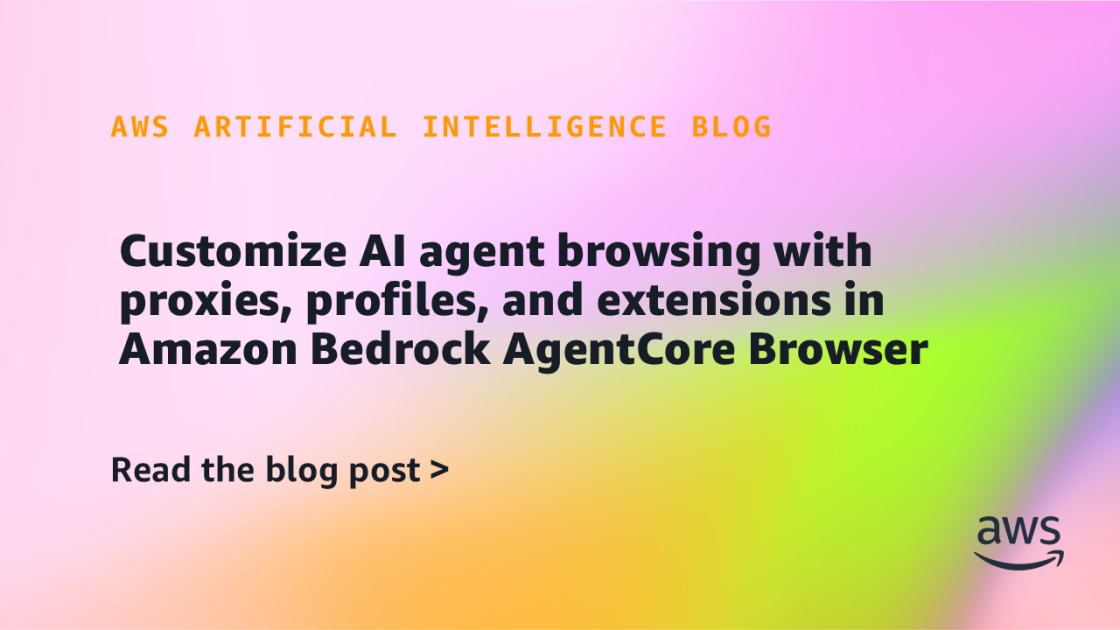
Today, we are announcing three new capabilities that address these requirements: proxy configuration, browser profiles, and browser extensions. Together, these features give you fine-grained control over how your AI agents interact with the web. This post will walk through each capability with configuration examples and practical use cases to help you get started.
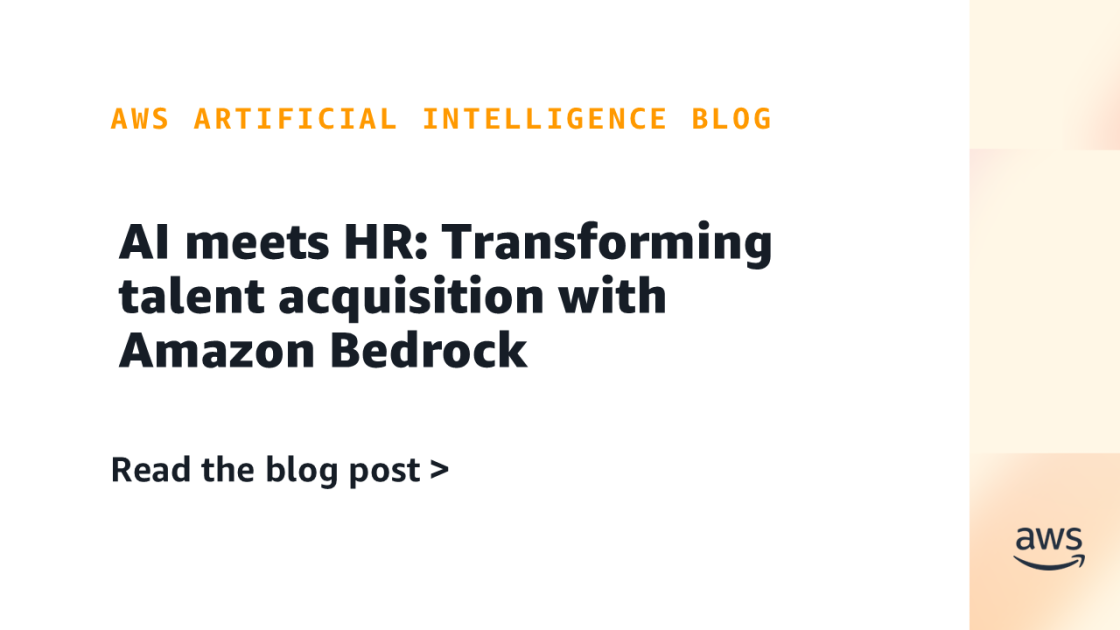
In this post, we show how to create an AI-powered recruitment system using Amazon Bedrock, Amazon Bedrock Knowledge Bases, AWS Lambda, and other AWS services to enhance job description creation, candidate communication, and interview preparation while maintaining human oversight.
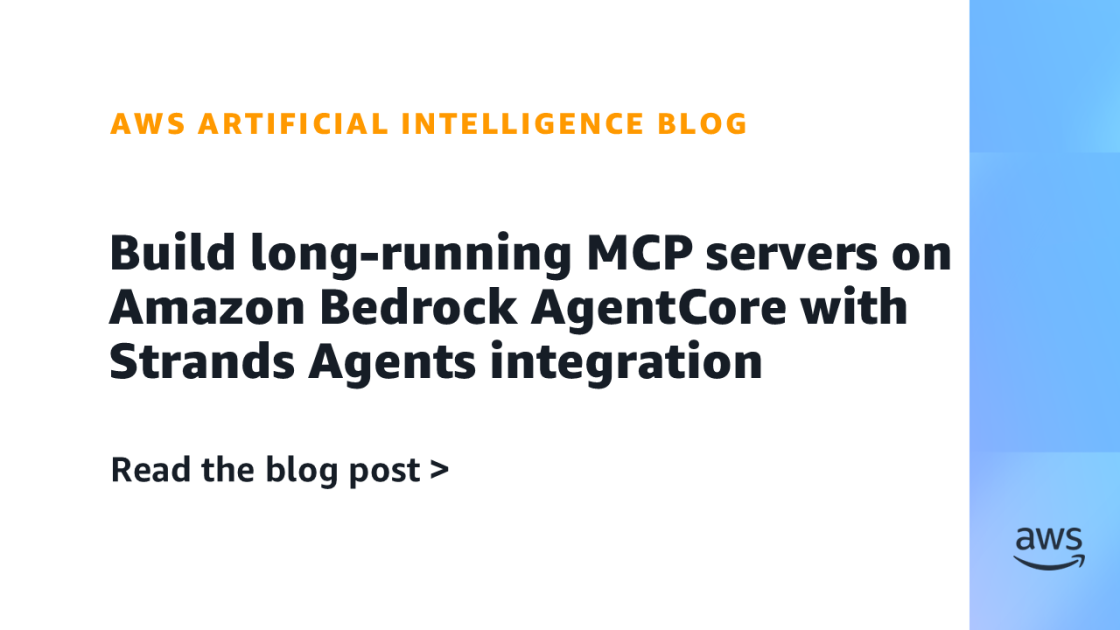
In this post, we provide you with a comprehensive approach to achieve this. First, we introduce a context message strategy that maintains continuous communication between servers and clients during extended operations. Next, we develop an asynchronous task management framework that allows your AI agents to initiate long-running processes without blocking other operations. Finally, we demonstrate how to bring these strategies together with Amazon Bedrock AgentCore and Strands Agents to build production-ready AI agents that can handle complex, time-intensive operations reliably.
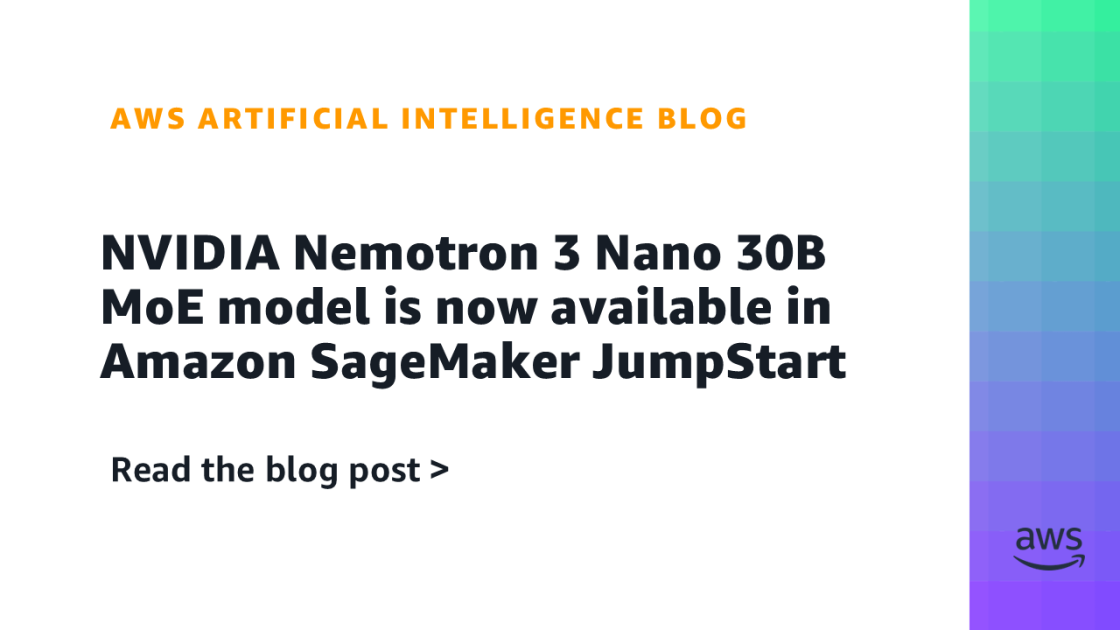
Today we’re excited to announce that the NVIDIA Nemotron 3 Nano 30B model with 3B active parameters is now generally available in the Amazon SageMaker JumpStart model catalog. You can accelerate innovation and deliver tangible business value with Nemotron 3 Nano on Amazon Web Services (AWS) without having to manage model deployment complexities. You can power your generative AI applications with Nemotron capabilities using the managed deployment capabilities offered by SageMaker JumpStart.
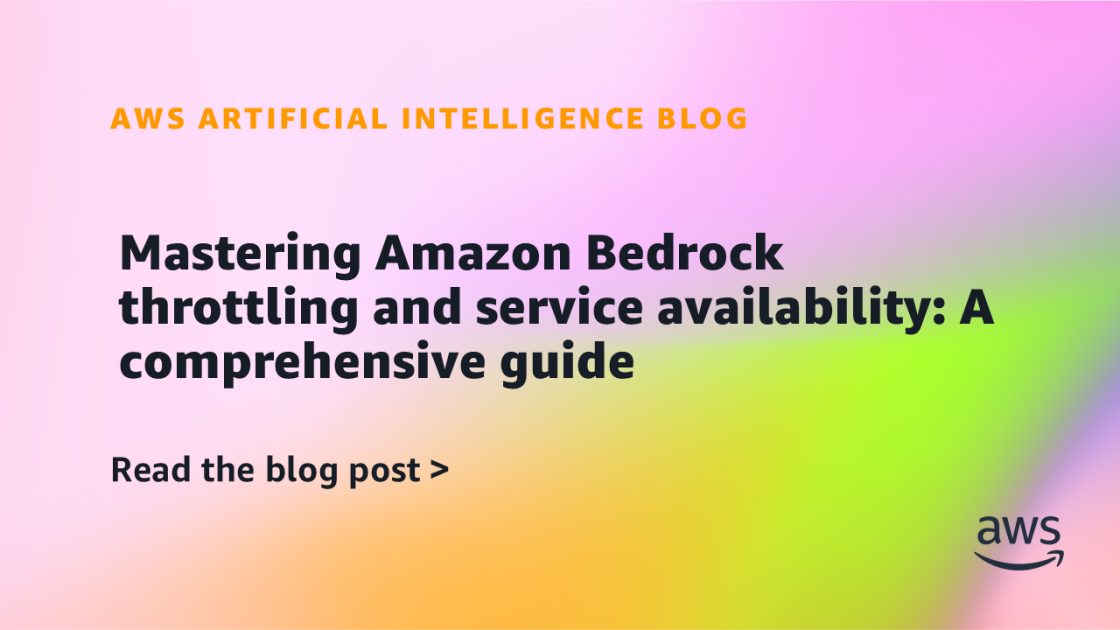
This post shows you how to implement robust error handling strategies that can help improve application reliability and user experience when using Amazon Bedrock. We'll dive deep into strategies for optimizing performances for the application with these errors. Whether this is for a fairly new application or matured AI application, in this post you will be able to find the practical guidelines to operate with on these errors.
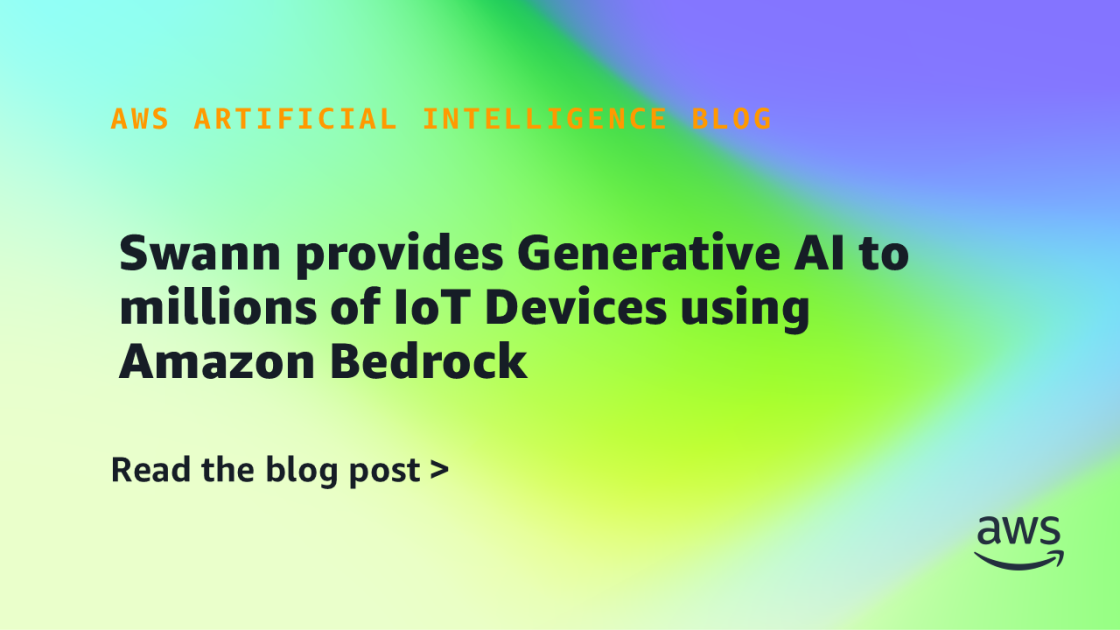
This post shows you how to implement intelligent notification filtering using Amazon Bedrock and its gen-AI capabilities. You'll learn model selection strategies, cost optimization techniques, and architectural patterns for deploying gen-AI at IoT scale, based on Swann Communications deployment across millions of devices.
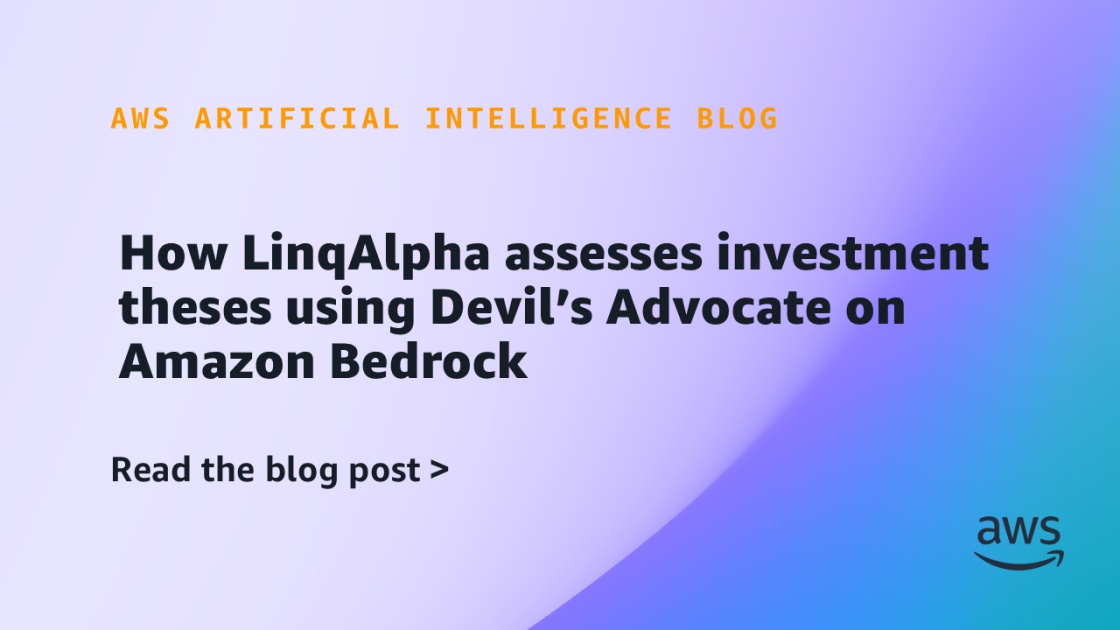
LinqAlpha is a Boston-based multi-agent AI system built specifically for institutional investors. The system supports and streamlines agentic workflows across company screening, primer generation, stock price catalyst mapping, and now, pressure-testing investment ideas through a new AI agent called Devil’s Advocate. In this post, we share how LinqAlpha uses Amazon Bedrock to build and scale Devil’s Advocate.
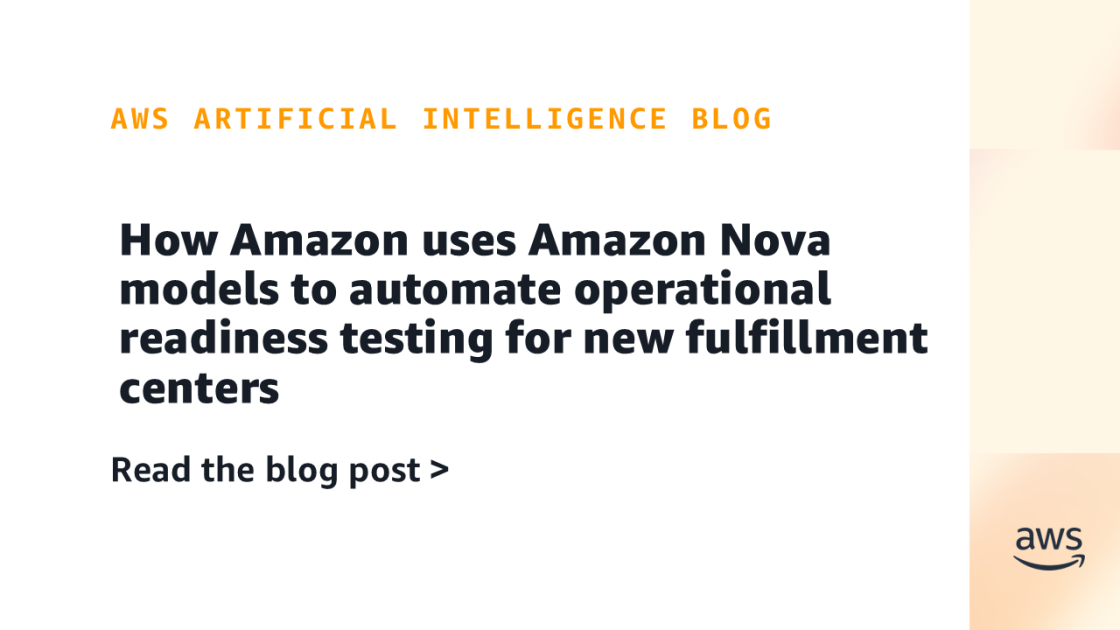
In this post, we discuss how Amazon Nova in Amazon Bedrock can be used to implement an AI-powered image recognition solution that automates the detection and validation of module components, significantly reducing manual verification efforts and improving accuracy.
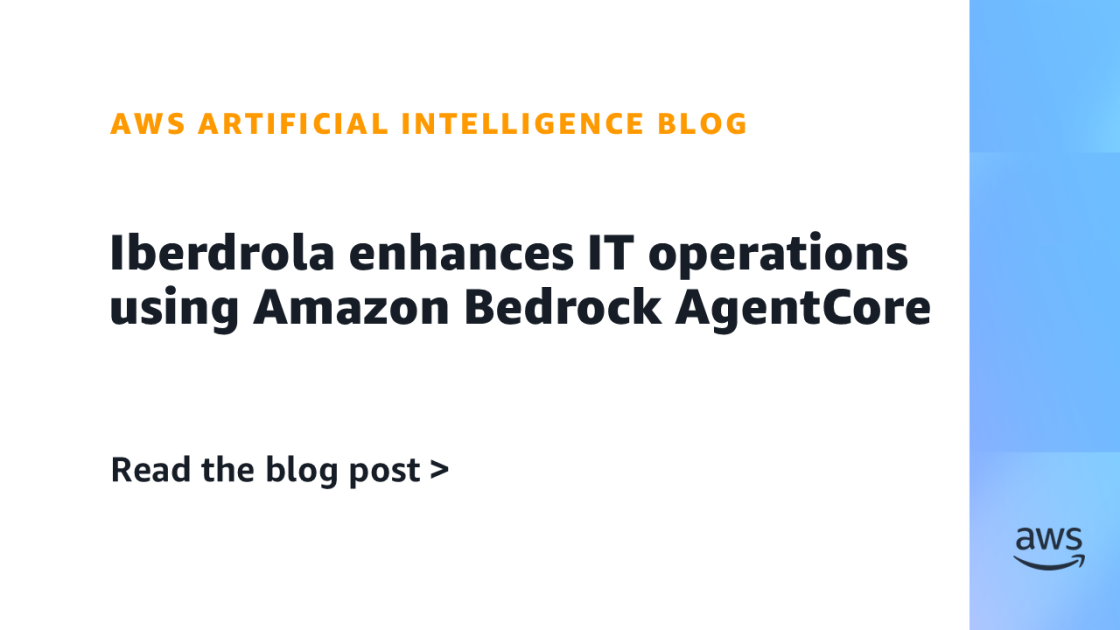
Iberdrola, one of the world’s largest utility companies, has embraced cutting-edge AI technology to revolutionize its IT operations in ServiceNow. Through its partnership with AWS, Iberdrola implemented different agentic architectures using Amazon Bedrock AgentCore, targeting three key areas: optimizing change request validation in the draft phase, enriching incident management with contextual intelligence, and simplifying change model selection using conversational AI. These innovations reduce bottlenecks, help teams accelerate ticket resolution, and deliver consistent and high-quality data handling throughout the organization.
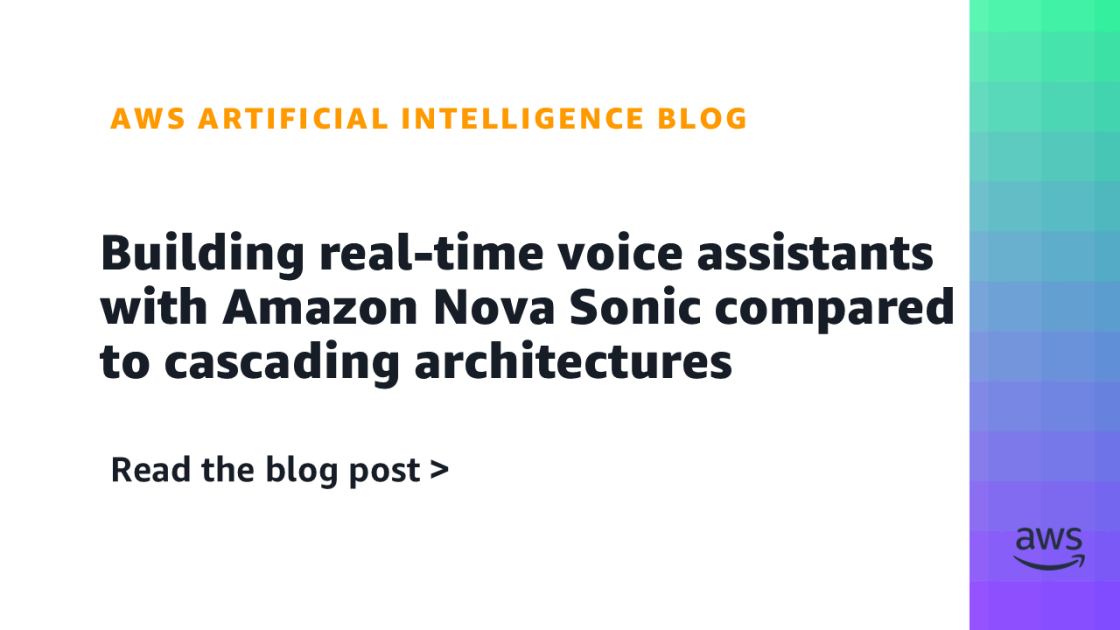
Amazon Nova Sonic delivers real-time, human-like voice conversations through the bidirectional streaming interface. In this post, you learn how Amazon Nova Sonic can solve some of the challenges faced by cascaded approaches, simplify building voice AI agents, and provide natural conversational capabilities. We also provide guidance on when to choose each approach to help you make informed decisions for your voice AI projects.
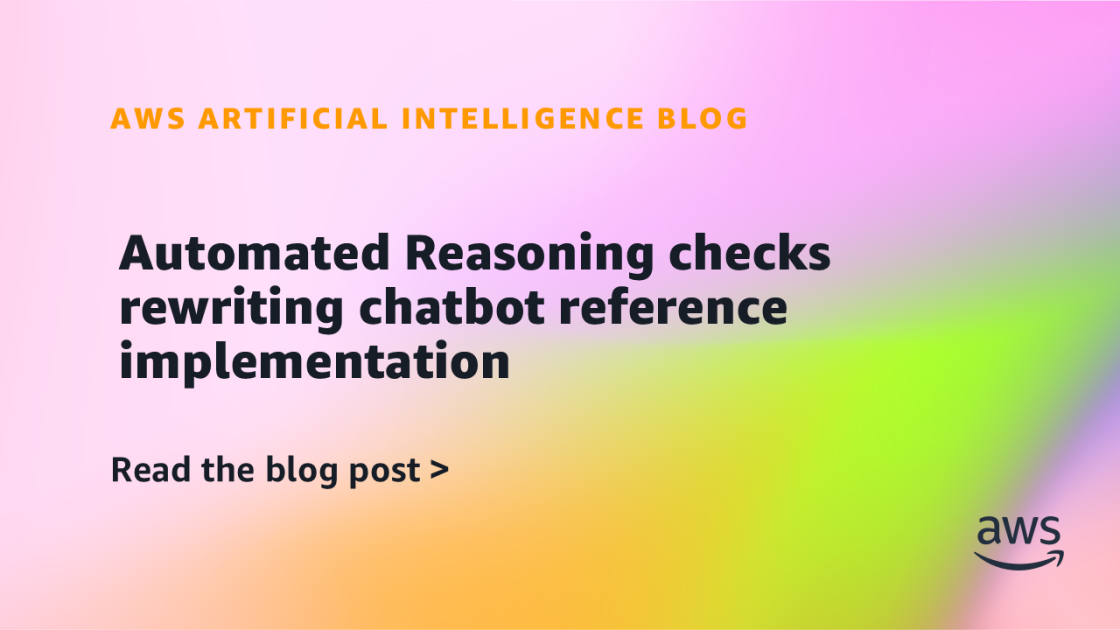
This blog post dives deeper into the implementation architecture for the Automated Reasoning checks rewriting chatbot.
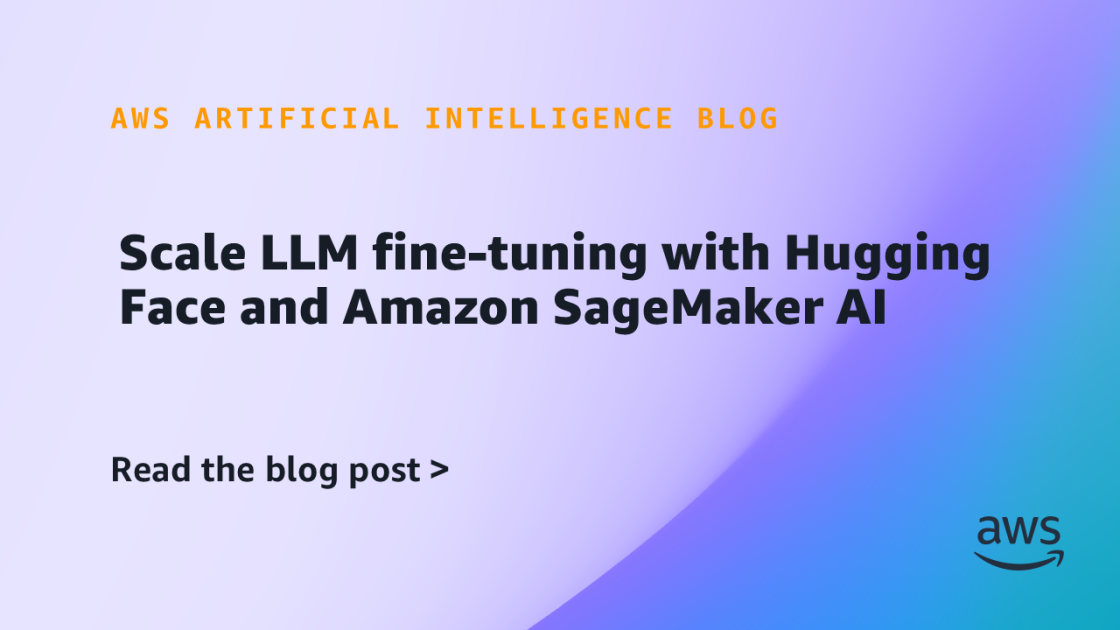
In this post, we show how this integrated approach transforms enterprise LLM fine-tuning from a complex, resource-intensive challenge into a streamlined, scalable solution for achieving better model performance in domain-specific applications.
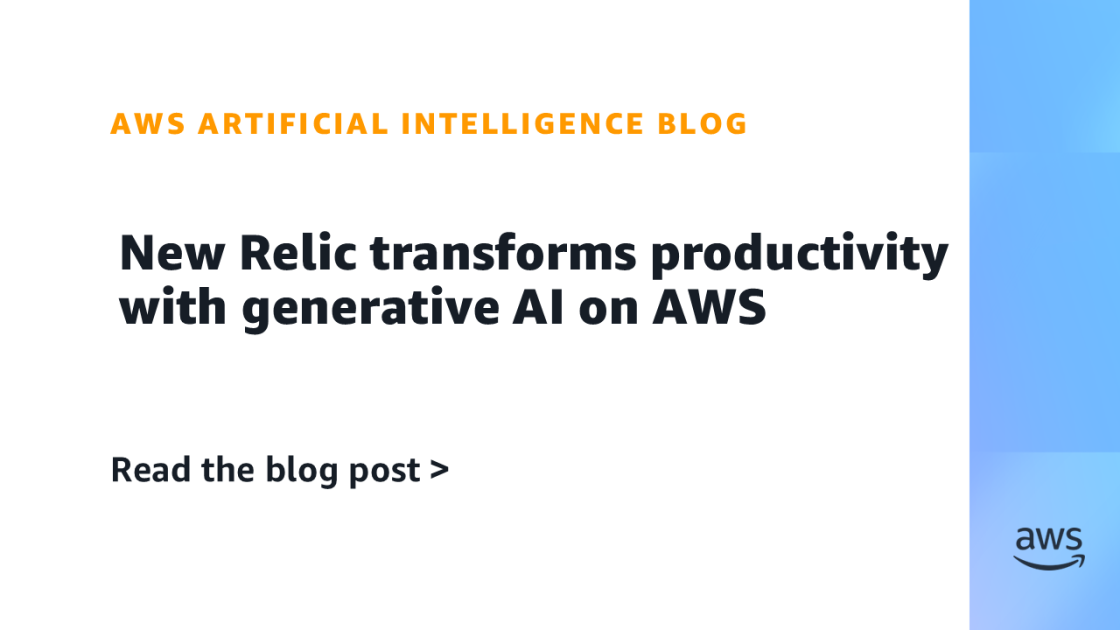
Working with the Generative AI Innovation Center, New Relic NOVA (New Relic Omnipresence Virtual Assistant) evolved from a knowledge assistant into a comprehensive productivity engine. We explore the technical architecture, development journey, and key lessons learned in building an enterprise-grade AI solution that delivers measurable productivity gains at scale.
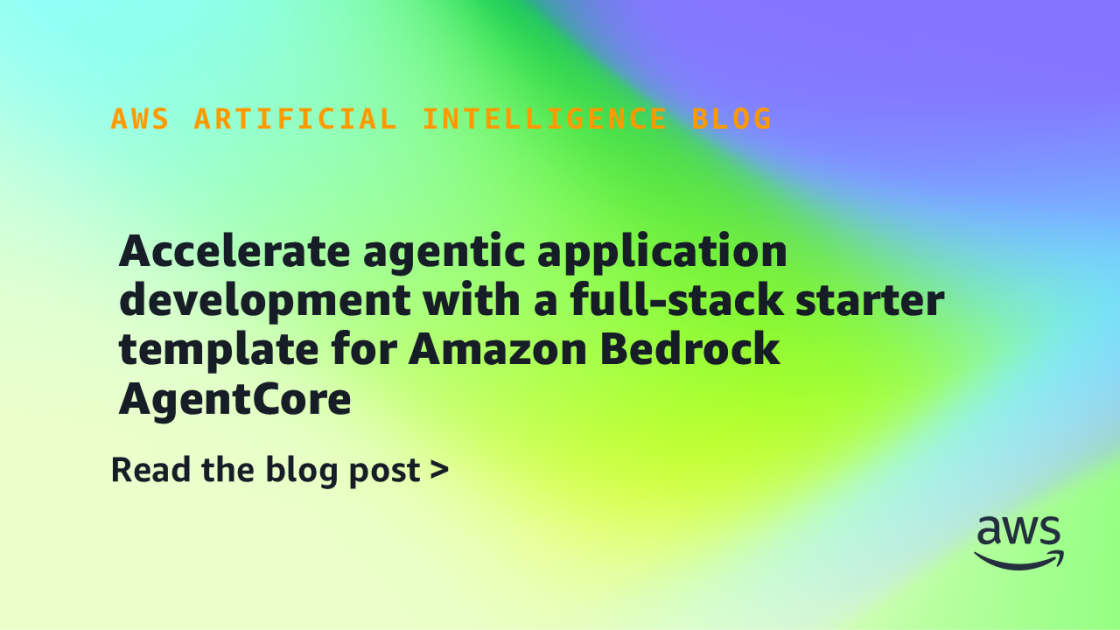
In this post, you will learn how to deploy Fullstack AgentCore Solution Template (FAST) to your Amazon Web Services (AWS) account, understand its architecture, and see how to extend it for your requirements. You will learn how to build your own agent while FAST handles authentication, infrastructure as code (IaC), deployment pipelines, and service integration.
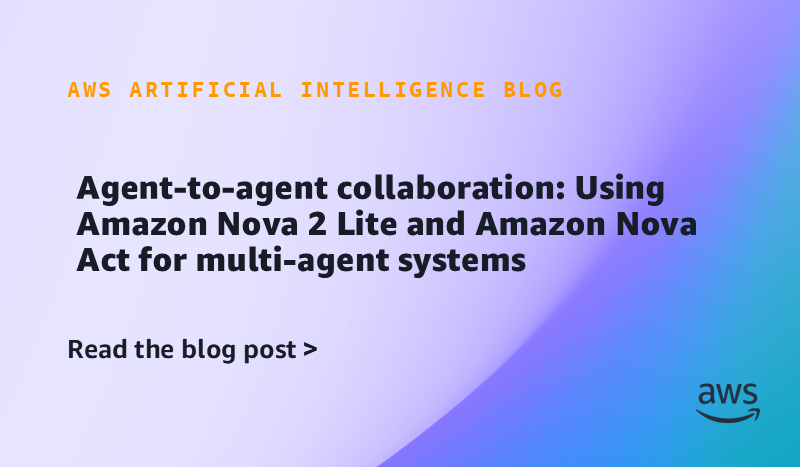
This post walks through how agent-to-agent collaboration on Amazon Bedrock works in practice, using Amazon Nova 2 Lite for planning and Amazon Nova Act for browser interaction, to turn a fragile single-agent setup into a predictable multi-agent system.
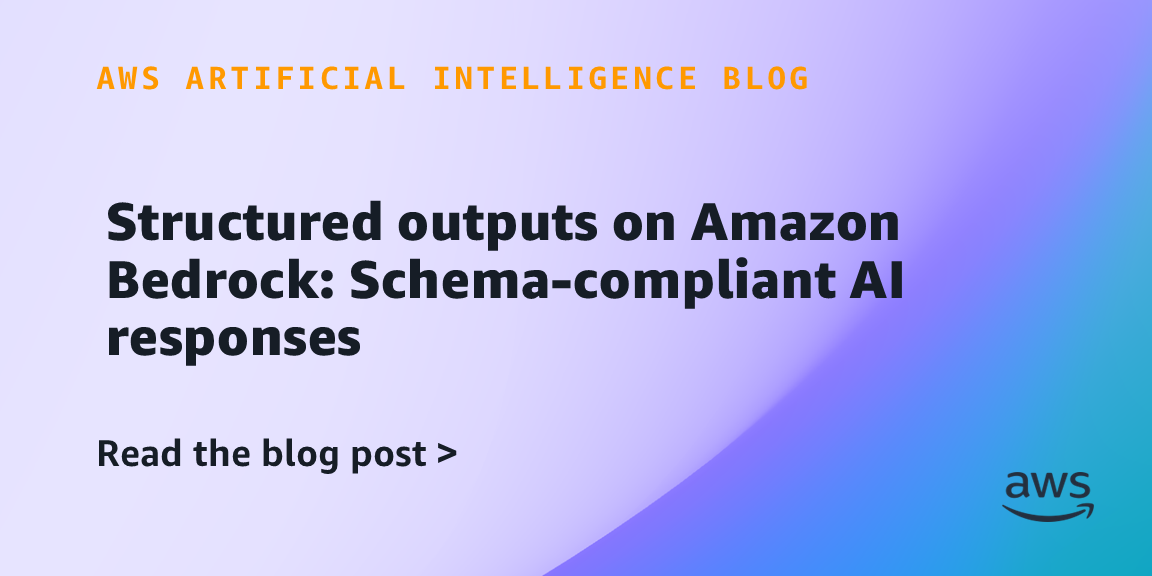
Today, we're announcing structured outputs on Amazon Bedrock—a capability that fundamentally transforms how you can obtain validated JSON responses from foundation models through constrained decoding for schema compliance. In this post, we explore the challenges of traditional JSON generation and how structured outputs solves them. We cover the two core mechanisms—JSON Schema output format and strict tool use—along with implementation details, best practices, and practical code examples.
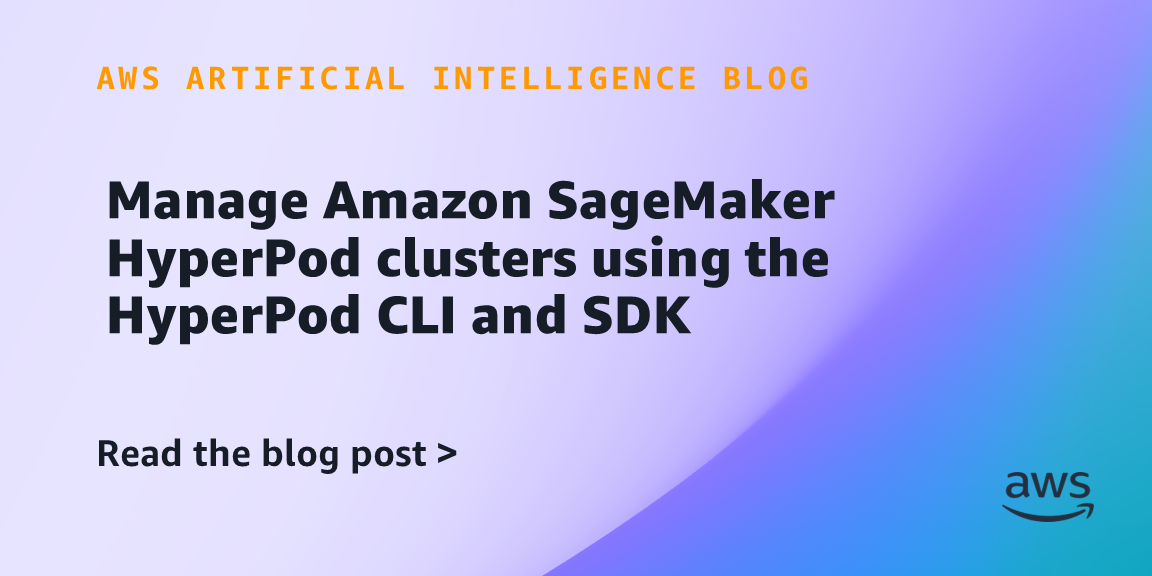
In this post, we demonstrate how to use the CLI and the SDK to create and manage SageMaker HyperPod clusters in your AWS account. We walk through a practical example and dive deeper into the user workflow and parameter choices.
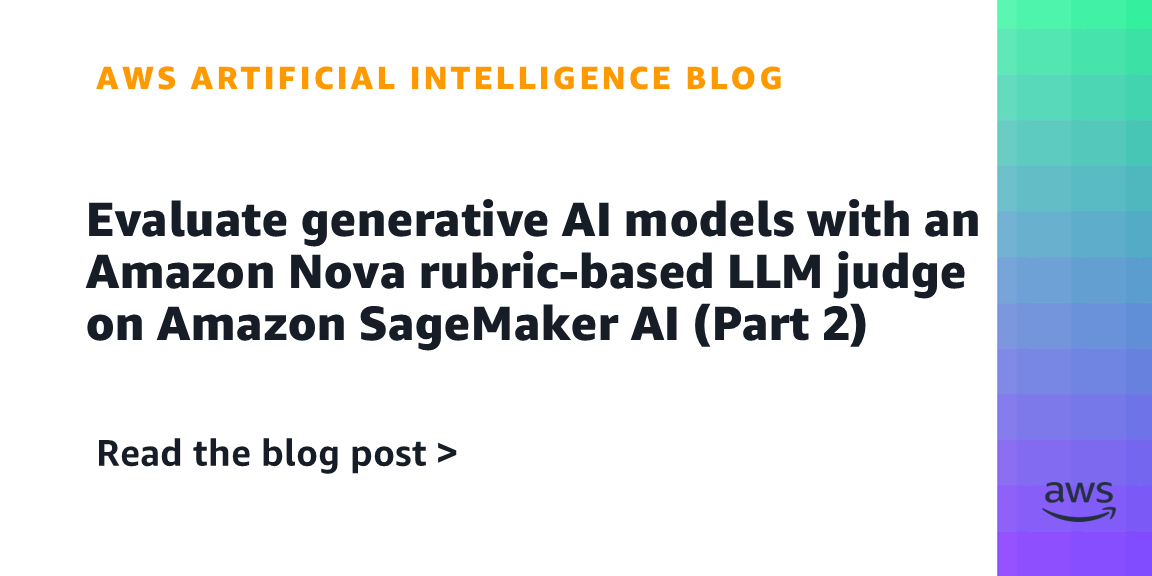
In this post, we explore the Amazon Nova rubric-based judge feature: what a rubric-based judge is, how the judge is trained, what metrics to consider, and how to calibrate the judge. We chare notebook code of the Amazon Nova rubric-based LLM-as-a-judge methodology to evaluate and compare the outputs of two different LLMs using SageMaker training jobs.
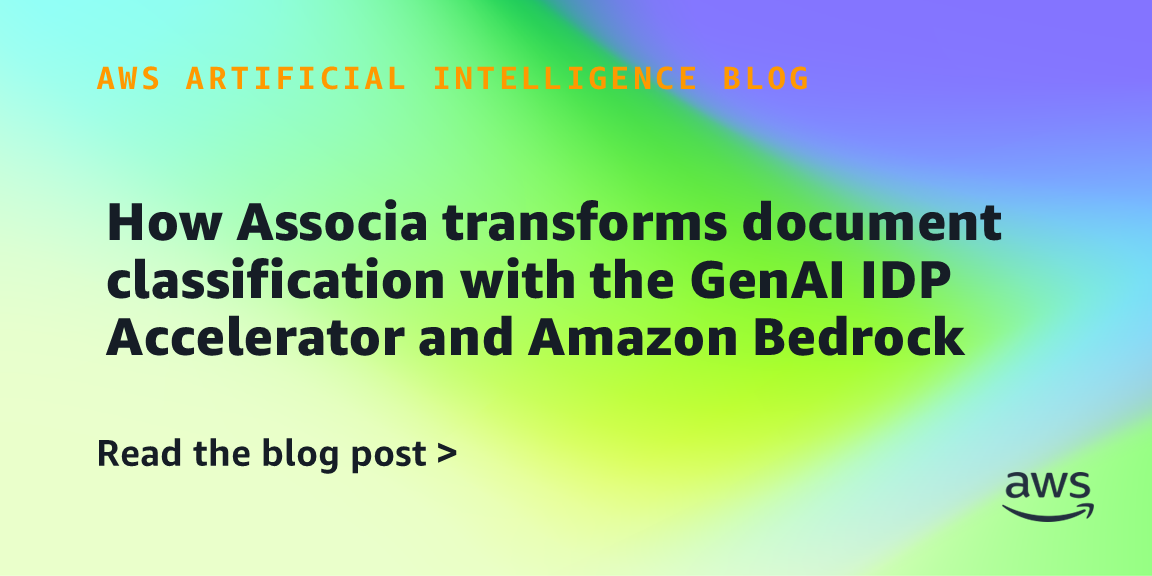
Associa collaborated with the AWS Generative AI Innovation Center to build a generative AI-powered document classification system aligning with Associa’s long-term vision of using generative AI to achieve operational efficiencies in document management. The solution automatically categorizes incoming documents with high accuracy, processes documents efficiently, and provides substantial cost savings while maintaining operational excellence. The document classification system, developed using the Generative AI Intelligent Document Processing (GenAI IDP) Accelerator, is designed to integrate seamlessly into existing workflows. It revolutionizes how employees interact with document management systems by reducing the time spent on manual classification tasks.

In this post, you will learn how to configure and use Amazon Nova Multimodal Embeddings for media asset search systems, product discovery experiences, and document retrieval applications.
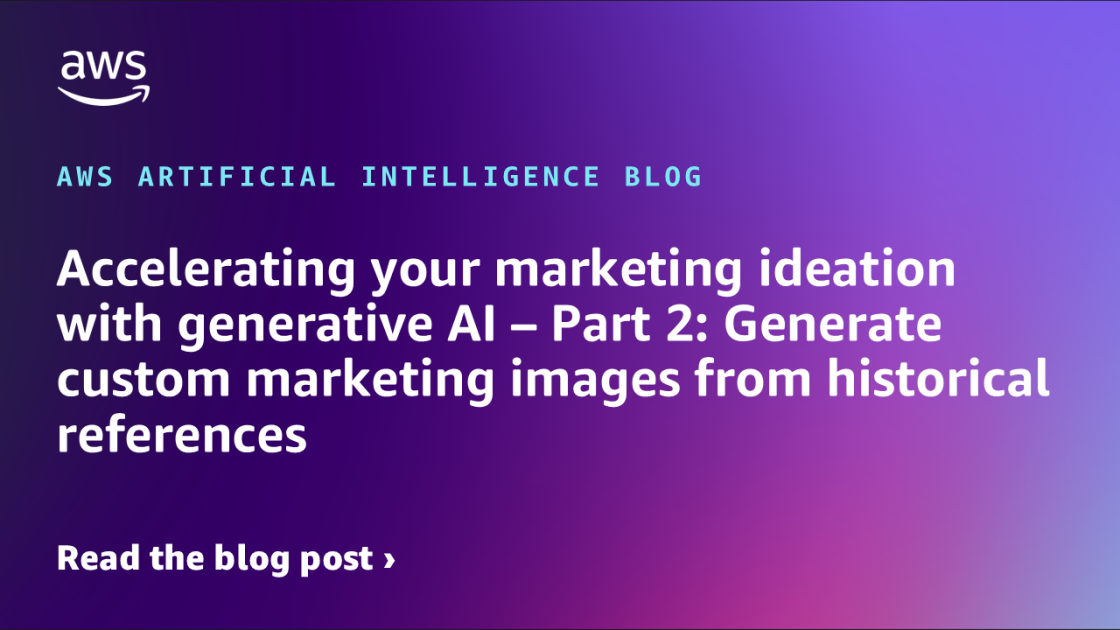
Building upon our earlier work of marketing campaign image generation using Amazon Nova foundation models, in this post, we demonstrate how to enhance image generation by learning from previous marketing campaigns. We explore how to integrate Amazon Bedrock, AWS Lambda, and Amazon OpenSearch Serverless to create an advanced image generation system that uses reference campaigns to maintain brand guidelines, deliver consistent content, and enhance the effectiveness and efficiency of new campaign creation.
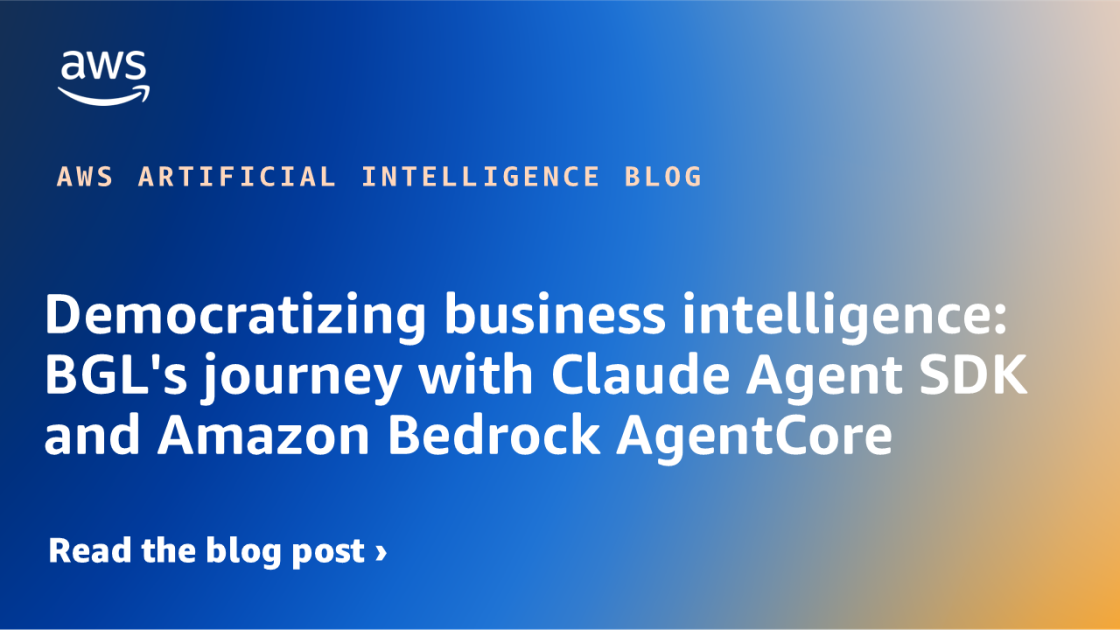
BGL is a leading provider of self-managed superannuation fund (SMSF) administration solutions that help individuals manage the complex compliance and reporting of their own or a client’s retirement savings, serving over 12,700 businesses across 15 countries. In this blog post, we explore how BGL built its production-ready AI agent using Claude Agent SDK and Amazon Bedrock AgentCore.
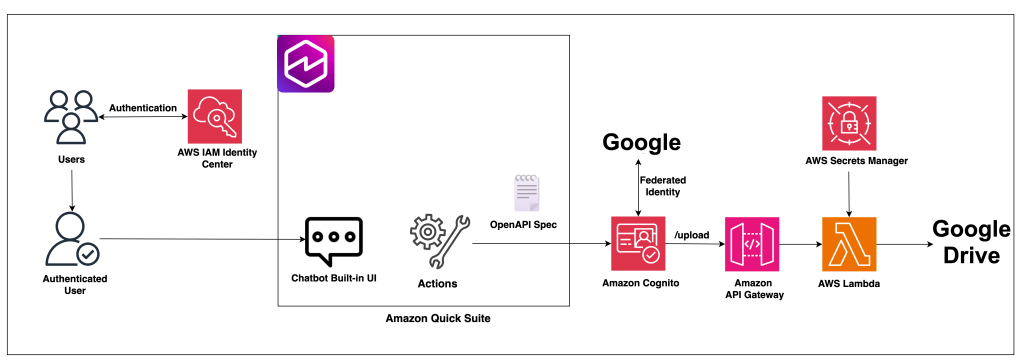
In this post, we demonstrate how to build a secure file upload solution by integrating Google Drive with Amazon Quick Suite custom connectors using Amazon API Gateway and AWS Lambda.
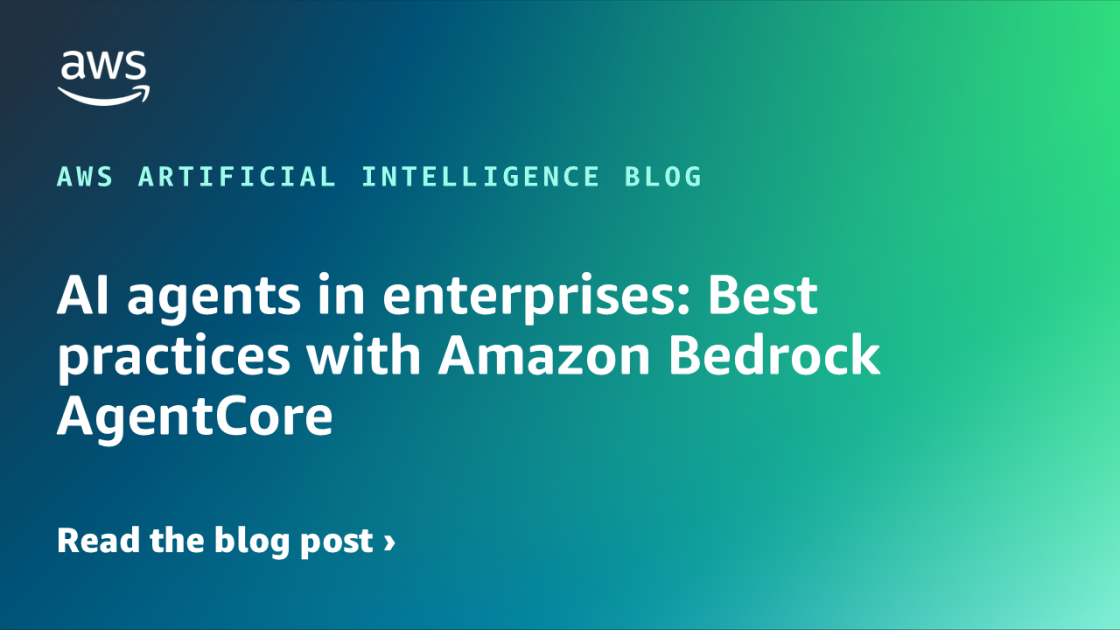
This post explores nine essential best practices for building enterprise AI agents using Amazon Bedrock AgentCore. Amazon Bedrock AgentCore is an agentic platform that provides the services you need to create, deploy, and manage AI agents at scale. In this post, we cover everything from initial scoping to organizational scaling, with practical guidance that you can apply immediately.
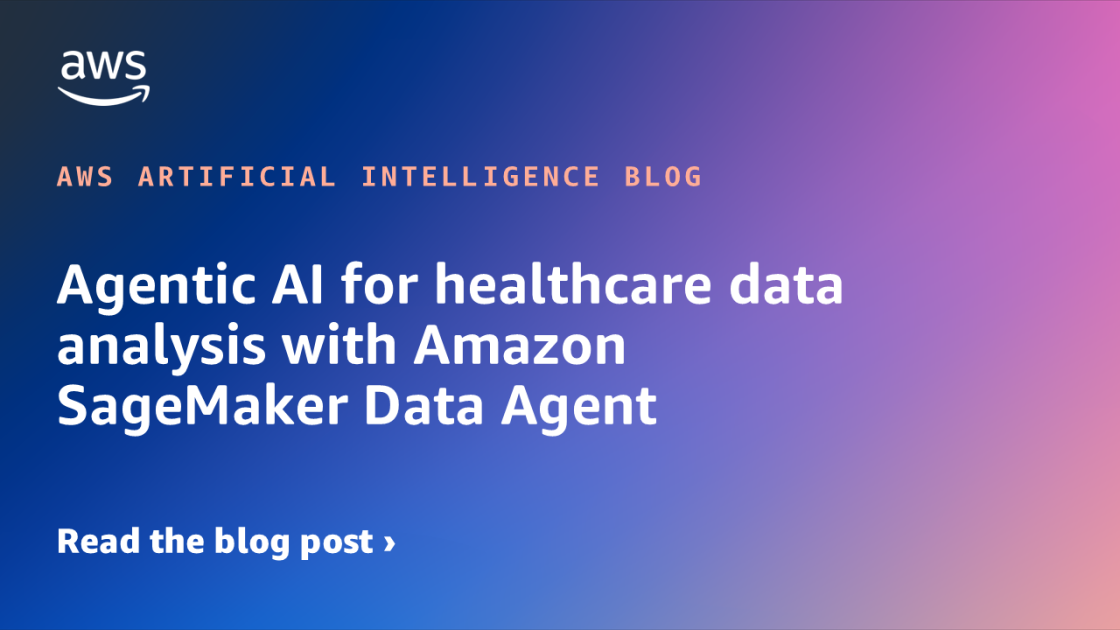
On November 21, 2025, Amazon SageMaker introduced a built-in data agent within Amazon SageMaker Unified Studio that transforms large-scale data analysis. In this post, we demonstrate, through a detailed case study of an epidemiologist conducting clinical cohort analysis, how SageMaker Data Agent can help reduce weeks of data preparation into days, and days of analysis development into hours—ultimately accelerating the path from clinical questions to research conclusions.
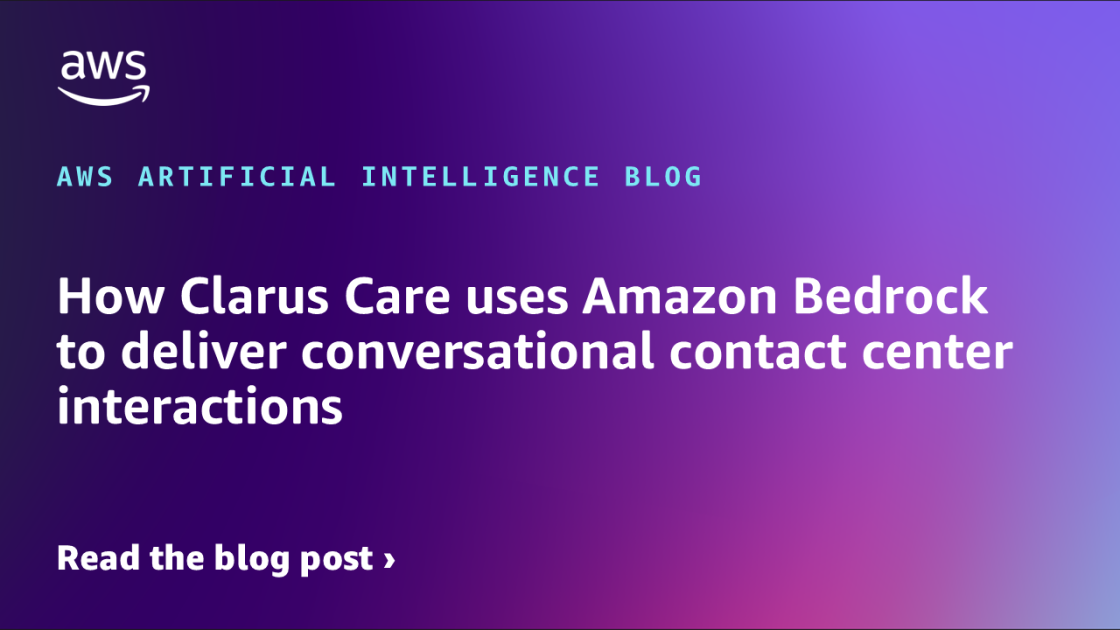
In this post, we illustrate how Clarus Care, a healthcare contact center solutions provider, worked with the AWS Generative AI Innovation Center (GenAIIC) team to develop a generative AI-powered contact center prototype. This solution enables conversational interaction and multi-intent resolution through an automated voicebot and chat interface. It also incorporates a scalable service model to support growth, human transfer capabilities--when requested or for urgent cases--and an analytics pipeline for performance insights.
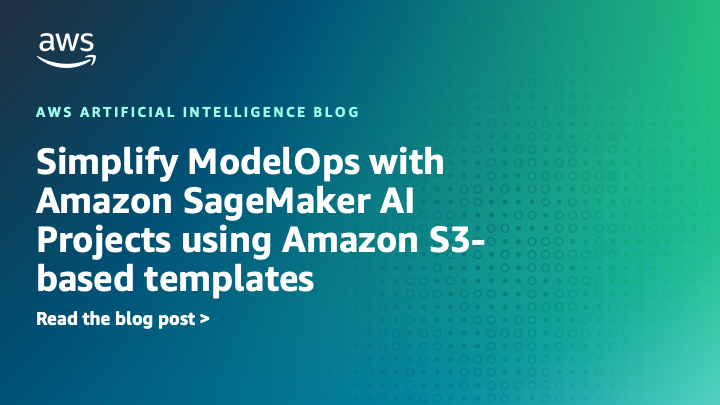
This post explores how you can use Amazon S3-based templates to simplify ModelOps workflows, walk through the key benefits compared to using Service Catalog approaches, and demonstrates how to create a custom ModelOps solution that integrates with GitHub and GitHub Actions—giving your team one-click provisioning of a fully functional ML environment.
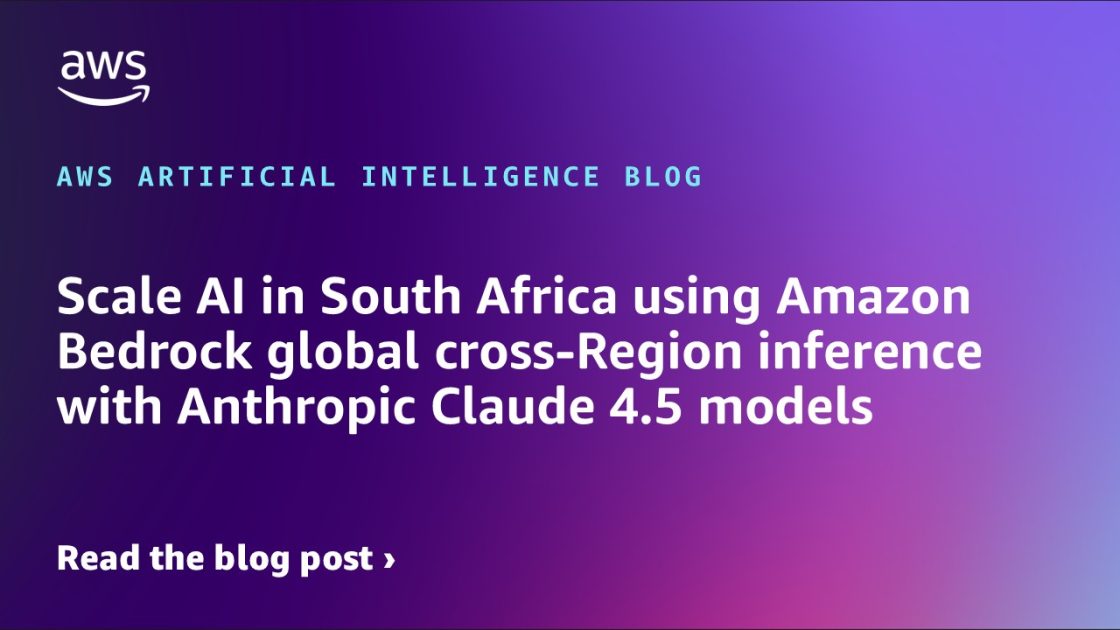
In this post, we walk through how global cross-Region inference routes requests and where your data resides, then show you how to configure the required AWS Identity and Access Management (IAM) permissions and invoke Claude 4.5 models using the global inference profile Amazon Resource Name (ARN). We also cover how to request quota increases for your workload. By the end, you'll have a working implementation of global cross-Region inference in af-south-1.
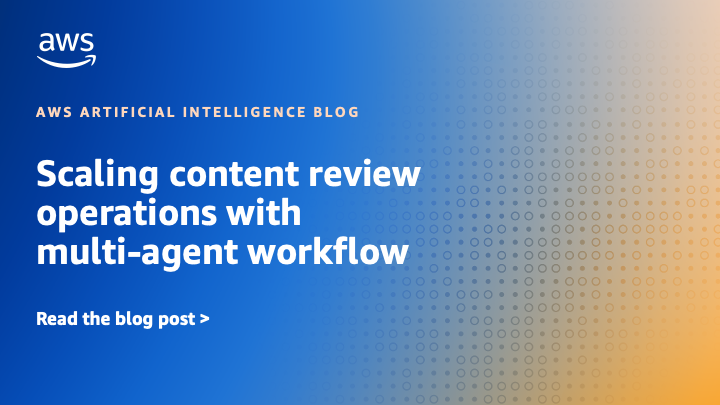
The agent-based approach we present is applicable to any type of enterprise content, from product documentation and knowledge bases to marketing materials and technical specifications. To demonstrate these concepts in action, we walk through a practical example of reviewing blog content for technical accuracy. These patterns and techniques can be directly adapted to various content review needs by adjusting the agent configurations, tools, and verification sources.

In this post, we walk you through Pushpay's journey in building this solution and explore how Pushpay used Amazon Bedrock to create a custom generative AI evaluation framework for continuous quality assurance and establishing rapid iteration feedback loops on AWS.

This blog post demonstrates how to build an intelligent contract management solution using Amazon Quick Suite as your primary contract management solution, augmented with Amazon Bedrock AgentCore for advanced multi-agent capabilities.

In this post, we discuss how to use AppSync Events as the foundation of a capable, serverless, AI gateway architecture. We explore how it integrates with AWS services for comprehensive coverage of the capabilities offered in AI gateway architectures. Finally, we get you started on your journey with sample code you can launch in your account and begin building.

This blog post describes how Totogi automates change request processing by partnering with the AWS Generative AI Innovation Center and using the rapid innovation capabilities of Amazon Bedrock.